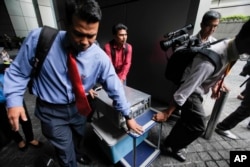Malaysian police on Monday announced they will investigate the investigators who are looking into allegations that millions of dollars from a state fund were channeled into the bank account of Prime Minister Najib Razak.
Police inspector-general Khalid Abu Bakar said officers will try to determine who leaked “classified documents to foreign nationals” and whether the materials are genuine or doctored.
The Wall Street Journal, on July 3, reported that $700 million may have moved through agencies and companies linked to 1MDB, owned by the government of Malaysia, before being deposited into accounts bearing Najib's name. The newspaper said its reporting relied on documents from a government probe.
Much of the money reportedly flowed into the prime minister’s accounts prior to the last general election in 2013, however it is unclear what happened to the money afterwards.
While investigators continue to probe the records, the corruption allegations have shaken Malaysia’s longtime ruling coalition. Police inspector-general Khalid suggested the leaks could be part of “a conspiracy to subvert Malaysia’s democratic process and topple the prime minister.”
Corruption allegations as political power play
A blogger on Saturday named three of the central bank's officials as being under investigation for allegedly leaking information about the money trail.
“Such allegations are without basis,” the bank said in a statement on Sunday. "In this regard the Bank has lodged a police report. Bank Negara Malaysia remains steadfast in our quest to uncovering the truth in a fair and just manner.”
Central bank personnel are among the members of a special task force looking into the 1MDB funds transfer.
Reports have also circulated that financier Low Taek Jho, known as having close ties to the prime minister's wife, allegedly obtained billions of dollars from 1MDB.
“All the stories that you are hearing about corruption, the prime minister, the prime minister's wife and how millions of dollars are being siphoned off from state-owned companies, this is part of the larger power play between (former prime minister) Mahathir and the current prime minister, Najib Razak”, said professor James Chin, the director of the Asia Institute at the University of Tasmania.
Splits in ruling party
Mahathir Mohamad, who turned 90 last week, was Malaysia's longest-serving prime minister. He has harshly criticized Najib, his hand-picked successor, for not making Malaysia a fully developed country, contending this has caused the country to lose credibility in the international arena.
Elections in Malaysia are not scheduled until 2018 but the predominant political party, the United Malays National Organization (UNMO), will have to decide by the end of this year “whether they want to support Najib against Mahathir or go with Mahathir and dump Najib,” said Professor Chin. “They need at least two years to prepare for the next general election.”
Malaysia's institutions are highly corrupted by the political process and the government ministers do not fully trust the police or any other domestic authority to investigate this matter, according to Chin, a specialist on Malaysian politics.
“The money that was taken from the state-owned enterprises was mainly used for the last general election,” Chin told VOA. “So nobody really wants to open up this can of worms because what would happen is that you would expose all the shenanigans that happened during the last general elections.”
Malaysia’s highly-contested 2013 elections resulted in the worst showing ever for the ruling Barisan Nasional coalition, which nonetheless was able to retain the majority it has held in parliament since 1957.
The investigations of the money trail will be used for political leverage either by Mahathir or Najib against the other, predicts Chin.
Mahathir has been critical of Najib since the party’s poor showing in the 2013 elections, but he sharpened his criticism in April when he brought up allegations that were previously considered taboo in a country with some of the world’s toughest censorship laws.
In 2009, two of Najib’s bodyguards were convicted of murdering a Mongolian woman, Altantuya Shaariibuu, who was allegedly trying to blackmail one of Najib’s close friends. The friend, Abdul Razak Baginda, helped broker a scandal-tainted submarine deal approved by Najib when he was defense minister.
Mahathir brought up the trial in April on his widely-read blog, suggesting that the prosecutions did not go far enough.
"People are asking who gave the orders," Mahathir wrote. "This involves human lives. It would be cruel if [the bodyguards] die just for carrying out orders."






